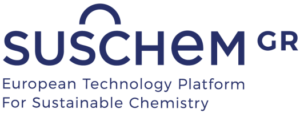Key Dates

– Accepted Abstracts will be presented as an oral or poster presentation and will be published in the Book of Abstracts.
– Accepted Conference Papers will be published in the Conference Proceedings.
For more information, check the Guidelines for Authors.
Topics
1. Green & Sustainable Technologies
Advancing green and sustainable technologies is necessary to achieving climate neutrality and resource efficiency. Focus areas include carbon capture, storage, and utilization (CCS/CCU) to mitigate emissions, and circular economy models to minimize waste and maximize resource reuse. Additionally, renewable energy networks integrating solar, wind, hydro and bioenergy towards decarbonization are in scope of this topic as well as biomass and waste valorization through innovative bioprocessing routes to convert residues into added value fuels and energy carriers, chemicals, or materials to foster a sustainable bioprocessing and industrial ecosystems.
Chair: to be announced
2. Biotechnology Engineering Systems
Biotechnology engineering drives innovation through metabolic engineering tools and systems-level approaches to invigorate biological and biochemical processes. From optimizing microbial production systems to developing new (bio)pharmaceuticals with enhanced custom properties, this field bridges biology with industrial applications. Biodiscovery and bioprospecting are also in scope to expand the natural product utilization, enabling the sustainable design of new molecules and processes for health, agriculture, the environment and other segments, while integrating systems biology and process engineering for enhanced productivity and precision.
Chair: to be announced
3. Power-to-X Systems
Power-to-X technologies convert renewable electricity into alternative energy carriers, chemicals and chemical energy, and fuels, enabling flexible energy storage and decarbonization across sectors. Through advanced power conversion systems, electricity can be transformed into hydrogen, synthetic fuels, chemical feedstocks or battery energy. These processes support storage of surplus renewable energy and its reconversion to motion, thermal, or kinetic energy forms, including challenges in intermittences, reinforcing energy security, resilience and autonomy and creating a circular, low-carbon energy economy.
Chair: to be announced
4. AI-Driven Engineering Solutions
Artificial intelligence and digital technologies revolutionize engineering by enabling predictive, data-driven, and autonomous systems. Digital Twins, machine learning, and advanced software tools, also empowering real-time optimization and adaptive control of processes are in scope. Big Data analytics reveals insights for efficiency and sustainability, allowing engineers to simulate, forecast, and optimize complex systems with unprecedented accuracy bridging the gap between computational intelligence and practical industrial performance.
Chair: to be announced
5. Process Engineering & Industrial Applications
This topic includes process design, synthesis, engineering and optimization work at experimental and/or simulation level to create efficient, safe, and sustainable process operations. Key developments also include process intensification, energy and resource integration, and digital control for dynamic systems. Optimization of scheduling, supply, and value chains are also in scope and ensure competitiveness and resilience in modern industries. This area drives innovation across manufacturing sectors, fostering scalable, cost-effective, and environmentally friendly solutions from concept to operation; also justified by comprehensive techno-economic and Life Cycle Assessments.
Chair: to be announced
6. Safe & Sustainable by Design Processes and Materials
The Safe and Sustainable by Design (SSbD) approach promotes innovation across both materials and processes, ensuring safety, circularity, and minimal environmental impact from the earliest design stages. Novel materials, advanced process engineering, and nanotechnology applications are developed for high performance, efficiency, recyclability, and reduced toxicity. Embedding sustainability and safety assessments in both process and product design fosters responsible innovation, driving the transition toward cleaner, safer, and more sustainable industrial systems.
Chair: to be announced


